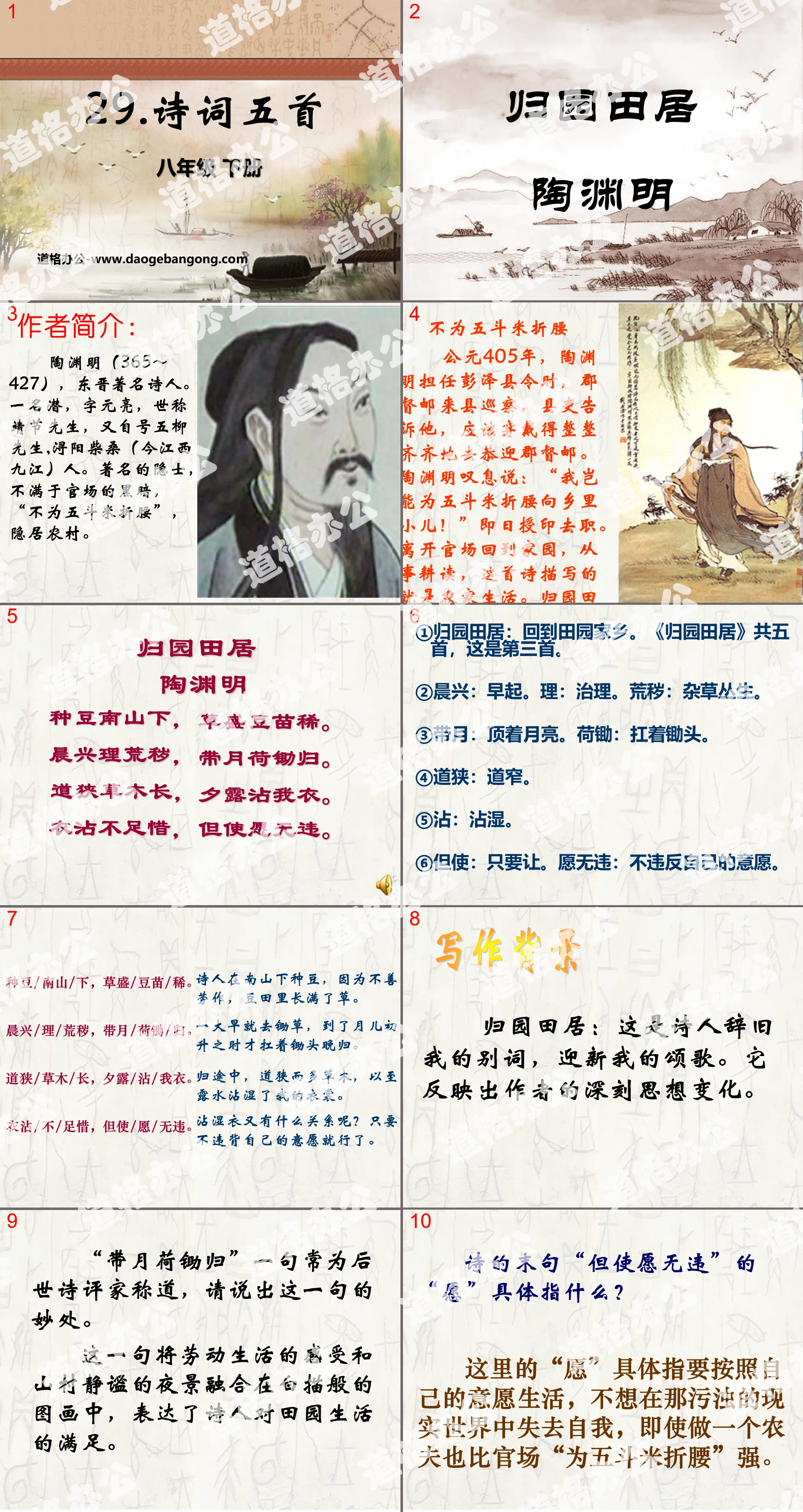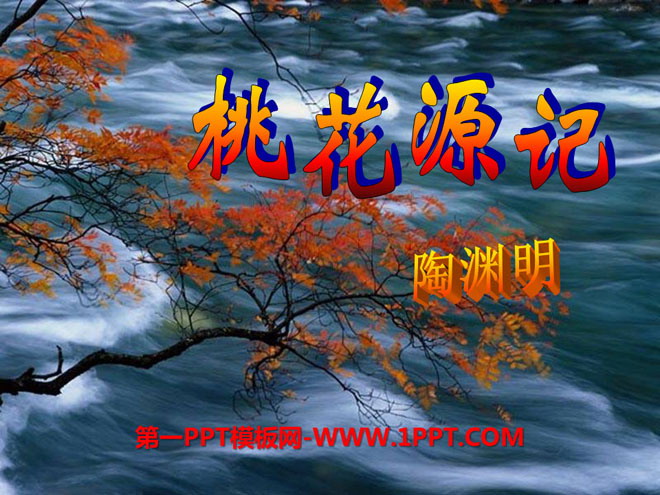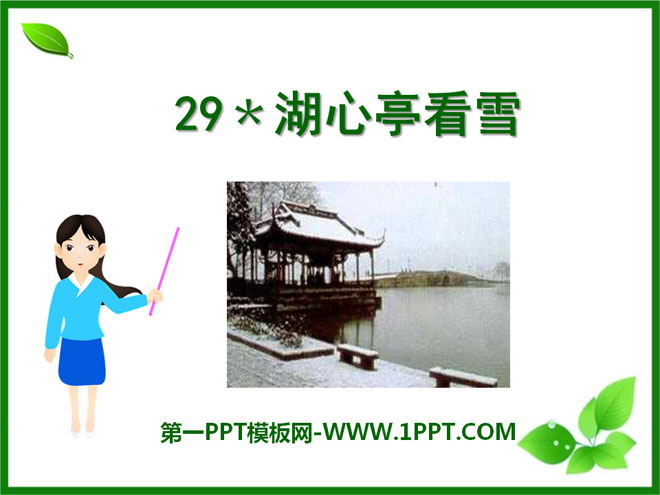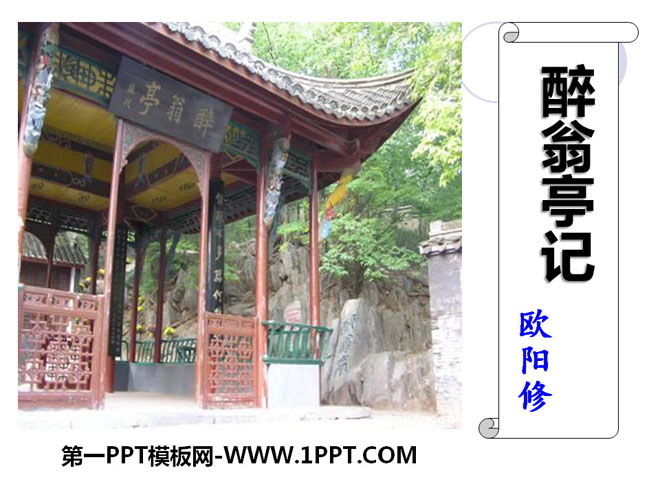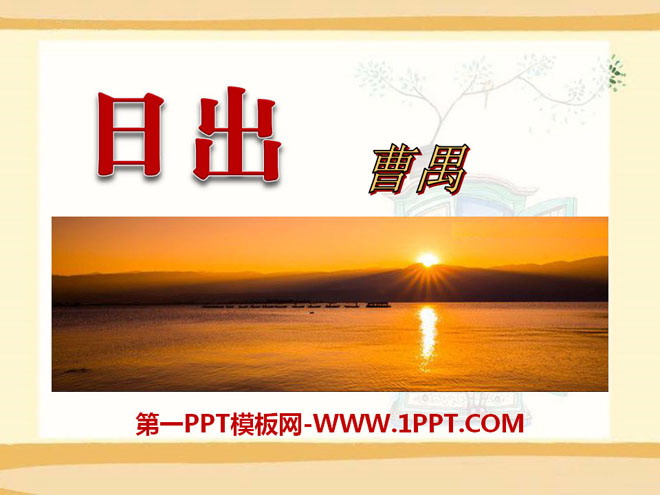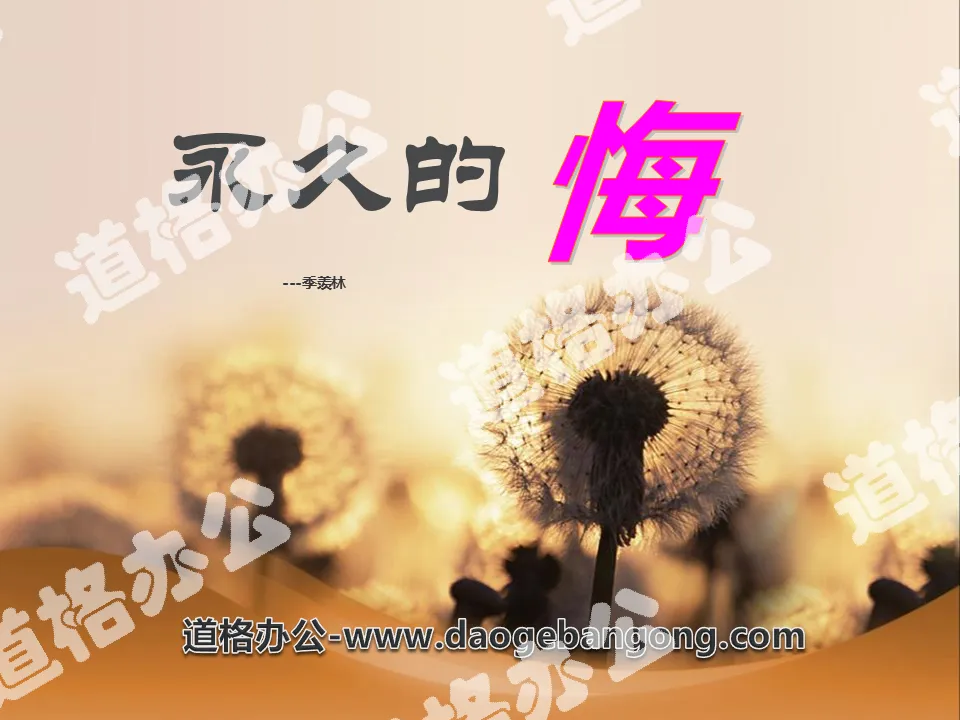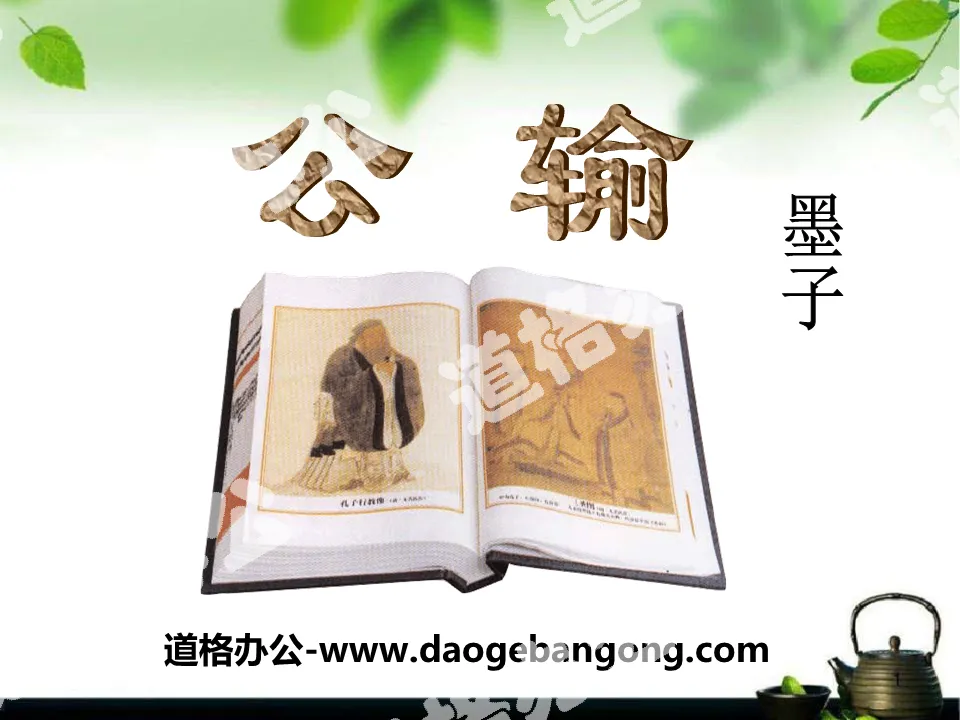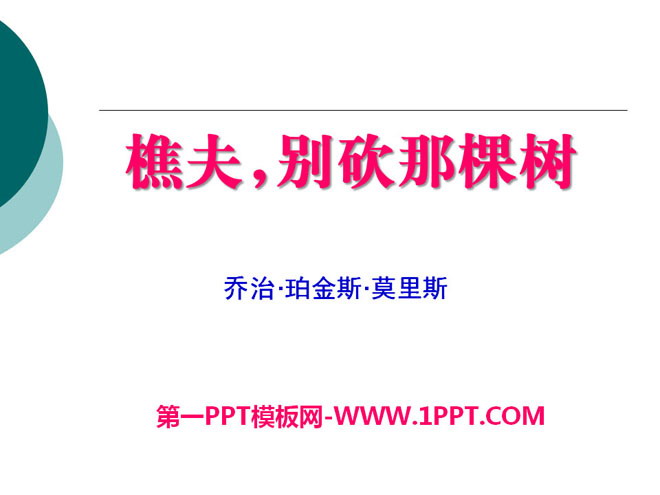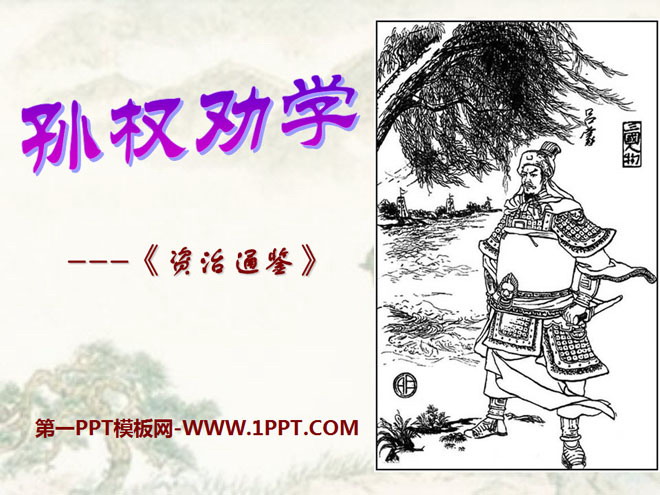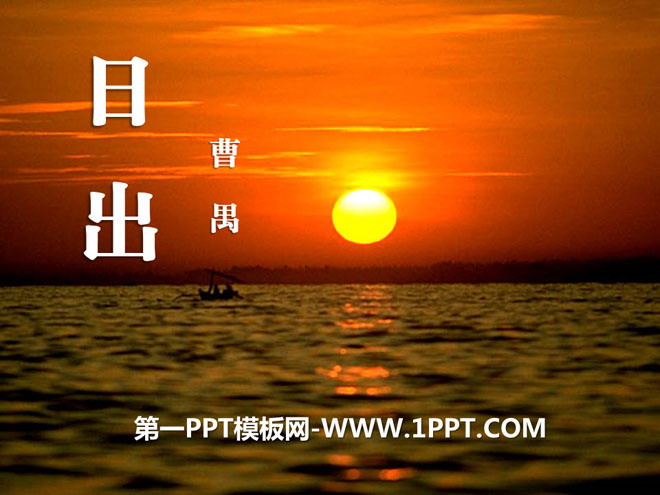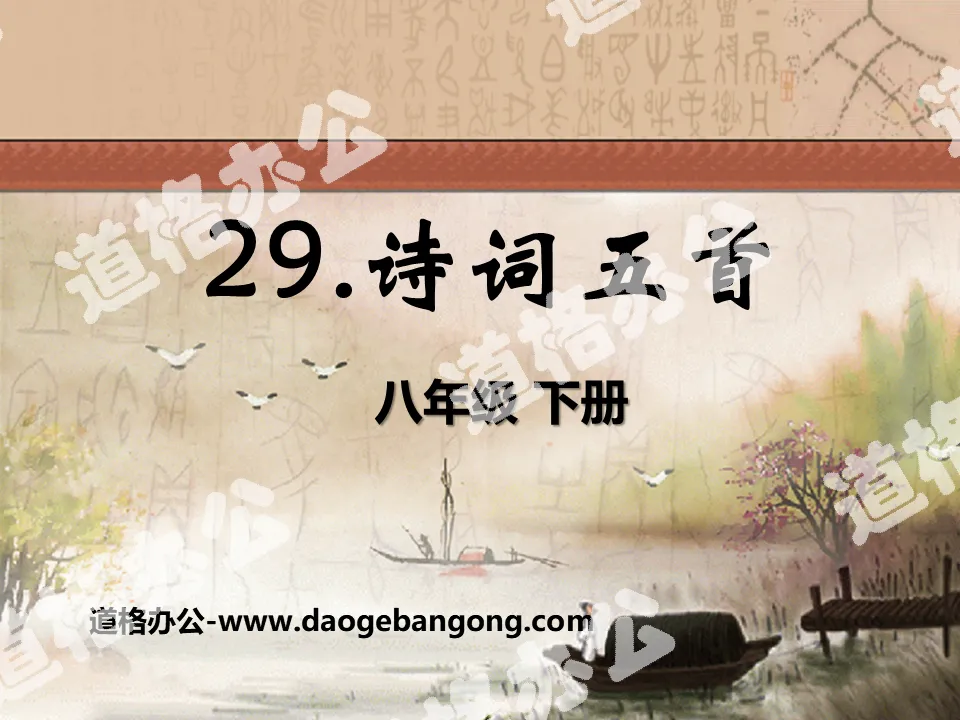
| Category | Format | Size |
|---|---|---|
| Chinese version of eighth grade Chinese language volume 2 | pptx | 6 MB |
Description
"Five Poems" PPT courseware 6
About the Author:
Tao Yuanming (365-427), a famous poet in the Eastern Jin Dynasty. A man named Qian, whose courtesy name was Yuanliang, was known as Mr. Jingjie in the world, and also called himself Mr. Wuliu. He was a native of Chaisang, Xunyang (now Jiujiang, Jiangxi). The famous hermit was dissatisfied with the darkness of the officialdom and lived in seclusion in the countryside.
Don’t give in to five buckets of rice
In 405 AD, when Tao Yuanming was the magistrate of Pengze County, the county governor came to the county for inspection. The county officials told him that he should dress neatly to greet the county governor. Tao Yuanming sighed and said, "How could I bow down to a village boy for five buckets of rice?" He was awarded the seal and resigned on the same day. After leaving officialdom and returning home, he engaged in farming and reading. This poem describes farm life. There are five poems in "Returning to the Garden and Living in the Fields", which were written in the second year after living in seclusion. This is the third poem.
Return to the garden and live in the countryside
Tao Yuanming
At the foot of the southern mountain where beans are planted, there are few bean seedlings in the grass.
I wake up in the morning to sort out the wasteland and filth, and return with a hoe in the moonlight.
The road is narrow, the grass and trees are long, and the evening dew touches my clothes.
It's not enough to regret the stain on your clothes, but your wishes are fulfilled.
①Return to the countryside and live in the countryside: Return to the countryside and hometown. "Returning to the Garden and Living in the Fields" has five songs in total, and this is the third one.
②Morning: Get up early. Reason: Governance. Dirty: overgrown with weeds.
③With the moon: Holding the moon. Hoe: Carrying a hoe.
④The road is narrow: the road is narrow.
⑤Dip: get wet.
⑥But make: Just let. Do not violate your wishes: Do not violate your own wishes.
writing background
Returning to the garden and living in the fields: This is the poet's farewell to the old self and his hymn to welcome the new. It reflects the author's profound ideological changes.
The line "Returning home from the hoe with the moon lotus" is often praised by later generations of poetry critics. Please tell me the beauty of this line.
This sentence combines the feelings of working life and the quiet night scene of the mountain village into a line drawing-like picture, expressing the poet's satisfaction with pastoral life.
What does the "wish" in the last line of the poem "but my wish will be true" specifically refer to?
The "wishes" here specifically refer to living according to one's own wishes and not wanting to lose oneself in the dirty real world. Even being a farmer is better than "bowing down for five buckets of rice" in the officialdom.
Writing features
The language of "Returning to the Garden and Living in the Fields" is plain and natural, simple and casual. The words "Grow beans at the foot of the south mountain" and "The evening dew touches my clothes" are not modified at all. The plain spoken language and the mellow poetry are harmoniously unified.
1. In the following explanation of the poem, the incorrect one is ( )
A. The first two sentences explain the location, content and growth of the bean sprouts.
B. Three or four sentences describe going out early and returning late, working hard in farming. "Desolate" refers to all kinds of weeds.
C. The fifth or sixth sentence carries the line "The lotus hoe returns", and it is written that the clothes are wet with dew as they walk through the grass at home.
D. The two lyrical sentences at the end, "wish", refer to hard work just to get a good harvest.
2. The inappropriate analysis of this poem is ( )
A. "Growing beans at the foot of the southern mountain" is a plain sentence, and "returning with a hoe under the moonlight" is a beautiful sentence. The front is solid and the back is empty. They set off each other and are in perfect harmony.
B. "Beans are planted at the foot of the southern mountain" and "the evening dew touches my clothes" are very natural and diluted terms, but they describe the difficulties of living in seclusion in a very concrete way.
C. The poet uses the most common objects in the countryside to write poems. His simple language and line drawing techniques create a mellow poetic atmosphere.
D. "Yi Zhan" is used to describe all the hardships of hard work, because the joy of living in seclusion is greater than the hard work, so it is "not cherished".
Looking at Dongting Lake as a gift to Prime Minister Zhang
Meng Haoran (689-740) was a native of Xiangyang (now Xiangyang, Hubei). In his early years, he studied hard behind closed doors and once lived in seclusion in Lumen Mountain. At the age of forty, he went to Chang'an to be elected as a Jinshi, but he returned to his hometown and traveled east to Wuyue. In the 25th year of Kaiyuan (737), Zhang Jiuling was demoted to the position of governor of Jing and applied for a job. However, he resigned and returned to his hometown in less than a year and died of illness two years later. Meng Haoran mainly lived in seclusion throughout his life and wrote many landscape and pastoral poems. He was the first to write landscape and pastoral poetry in the Tang Dynasty. He was called "Wang Meng" together with Wang Wei. This is a poem that Meng Haoran gave to Zhang Jiuling when he visited Chang'an, hoping to be promoted and hired by the prime minister.
Problem thinking
1. What scene of Dongting Lake did the poet describe?
Water and sky meet, vast and boundless.
2. What kind of wishes do the neck couplets and tail couplets of the poem express?
I hope to become an official, but no one recommends me.
3. Which words do you think are well used and why?
Example: Shake means to shake. It vividly expresses the turbulent water of Dongting Lake and its momentum.
4. What are the characteristics of this poem’s expression technique?
Metaphor, allusion.
Zhongnan bieye
Literary knowledge
Wang Wei (701-761), whose ancestral home was Qi County, Shanxi, was named Mojie. He was a poet of the Tang Dynasty, nicknamed "Poetry Buddha". There are more than 400 poems in existence today. Wang Wei is proficient in Buddhism. There is a Buddhist book called "Vimalakīrti Sutra", which is a book used by Vimalakīrti to teach his disciples. Wang Wei admired Vimalakīrti very much, so he named himself Wei with the courtesy name Mojirī. Wang Wei is famous for his poetry, calligraphy and painting. He is proficient in music and rhythm and is versatile. He is greatly influenced by Zen Buddhism.
This article is selected from "Wang Youcheng's Collection of Notes".
writing background
In his later years, Wang Wei rose to the rank of Shangshu Youcheng, and his position was not small. In fact, due to the repeated changes in the political situation, he had already seen the hardships and dangers of his official career, and wanted to escape from this troubled world. He ate fasting, worshiped Buddha, and lived leisurely. After about forty years old, he began to live a life of both officialdom and seclusion. What this poem describes is the leisurely mood of enjoying yourself.
Introduction to style
This poem belongs to the five lines of modern poetry and is one of the representative works of Wang Wei, a landscape and pastoral poet in the Tang Dynasty. Yu Biyun, a recent scholar, said in "A Brief Introduction to Poetry": "When you reach the end of the river when the water is exhausted, and then look at the clouds rising, you will see the endless wonderful scenery. It can be understood that the changes in the world are endless, and the meaning of learning is also endless. This is The two sentences have a wonderful way of transforming into one another."
Yujiaao
Li Qingzhao (1084-1155), also known as Yi'an, was an outstanding female writer in the Southern Song Dynasty and a native of Zhangqiu Mingshui (now Jinan, Shandong). Famous for his ci, he is also a poet and essayist, and is the author of ci theory. He enjoys a high reputation in the history of Chinese literature. Li Qingzhao was born in a family of scholar-bureaucrats who loved literature and art. After marrying Zhao Mingcheng, a Taipei student, they studied epigraphy, calligraphy and painting together, and lived a happy life. After the Jingkang Incident, she and Zhao Mingcheng fled to the south of the Yangtze River and lost most of their collection of cultural relics. Later, Zhao Mingcheng died of illness, and she drifted alone in Hangzhou, Yuezhou, and Jinhua, spending her later years in misery and loneliness. There are "Collected Works of Yi An" and "Yi An's Ci", which have been lost. Later generations have a compilation of "Shu Yu Ci".
Yujiaao
Li Qingzhao
The sky is connected with the clouds and waves, and the dawn fog is connected, and the stars are about to turn and a thousand sails are dancing.
It’s as if the soul of a dream has returned to the emperor’s home. Hearing the words of heaven, he asked me diligently where I was going.
I reported that the sun was setting after the long journey, and I learned some amazing sentences from poetry.
Ninety thousand miles away, the wind is rising, the wind is still, and the boat is blowing away to the three mountains.
explain:
Galaxy: Milky Way. Emperor's Place: The place where the Emperor of Heaven lives. Heavenly Language: The words of the Emperor of Heaven. I report that the road is long and the sun is setting: The road is long, which implies the meaning of Qu Yuan's "Li Sao": "The road is long and the road is far away, I will go up and down to search." At dusk, it implies the meaning of Qu Yuan's "Li Sao": "If you want to keep this spirit as trivial as possible, the sun will suddenly fade away." Sigh, sigh.詩: disciple, empty. Peng: A big bird in ancient myths and legends. Pengzhou: A boat like basil blown by the wind. The ancients used the metaphor of flying roots blown away by the wind. Blowing: blowing. Sanshan: The legendary three fairy mountains on the sea.
Sauvignon Blanc
Nalan Xingde
A passionate nobleman——Nalan Xingde
Nalan Xingde (1655~1685): a poet of Qing Dynasty. His original name was Chengde, but he changed his name to Chengde to avoid the taboo of Prince Baocheng; his courtesy name was Rongruo (Nalan Rongruo), his nickname was Lengya Mountain, and he was a native of Zhenghuang Banner in Manchuria. The eldest son of university scholar Nalan Mingzhu grew up in Beijing. In the fifteenth year of Kangxi's reign (1676), he became a Jinshi and was awarded the third-class guard of the Qianqing clan, and later moved to the first-class guard. In the 24th year of Kangxi's reign, he died of a sudden illness at the age of thirty-one.
Characteristics of the work: The poems are characterized by small poems, mostly sentimental, with occasional majestic works. I can also write poetry. There is "Tongzhitang Collection". The collection of poems is called "Nalan Ci" and has a separate version. He also collaborated with Xu Qianxue to compile and engrave various scriptures since the Tang Dynasty as "Tongzhitang Jingjie".
Achievements in poetry: Standing side by side with Chen Weisong, the representative of the Yangxian School, and Zhu Yizun, the leader of the Western Zhejiang School, they are also known as the "Three Great Masters of Qing Poetry". Kuang Zhouyi praised him as "the first lyricist in the early days of the Republic of China" in "Hui Feng Ci Hua".
Read the text aloud and add notes
Yuguan: Another name for Shanhaiguan.
Napan: That side, refers to outside the pass.
Tent: refers to the tent that guards the emperor's army.
Update: The ancient unit of time at night. A night is divided into five shifts.
钒钹钧: Crushed. Noisy, noisy.
Nalan Xingde admired Li Yu of the Southern Tang Dynasty, and his poems were clear, natural, and pathos, which is reflected in this song "Long Love". Although he wrote about homesickness during the journey, it was also long and emotional.
The first part of the poem uses the overlapping use of "mountain is one step away, water is one step away" to illustrate the distance between oneself and one's hometown. The next film uses the climate change of "the first watch of the wind and the second watch of the snow" to exaggerate the author's lonely feelings at this time. The wind and snow interrupted his homesick dreams. In addition to being depressed, he missed the peace and tranquility of his hometown even more. The author combines the elegance and sadness with the description of the majestic customs of the border village. The combination of these two sublimates the theme of traveling in nostalgia.
Keywords: Teaching courseware of five poems, Chinese version of the second volume of eighth grade Chinese courseware, download of eighth grade Chinese slide courseware, download of PPT courseware of five poems, .ppt format
For more information about the "Five Poems" PPT courseware, please click on the "Five Poems" ppt tab.
"Five Poems" PPT courseware 11:
"Five Poems" PPT courseware 11 There is a road to the mountain of books 1. Get to know the author Du Fu (712-770), a great realist poet in the Tang Dynasty, is known as the Saint of Poetry. Zimei, born in Gong County, Henan Province (now Gong County, Henan Province), called himself Shaoling Yelao, and was known as Du Shaoling, Du Gongbu, etc. in the world. have"..
"Five Poems" PPT courseware 10:
"Five Poems" PPT Courseware 10 Learning Objectives 1. Read aloud repeatedly to understand the meaning of the poem, the meaning of the words and the author's thoughts and feelings. 2. Understand the form of ancient poetry and the characteristics of word choice and sentence making. 3. Integrate into poetry and painting, and explore the interest and interest of poetry. Wen Guanjun closed the river...
"Five Poems" PPT courseware 9:
"Five Poems" PPT Courseware 9 Learning Objectives 1. Recite the poems, understand the meaning and emotion expressed by the poems through repeated reading, and taste the poetry. 2. Search for information and understand the relevant authors and background. 3. Understand the famous sentences and understand the artistic conception and charm of classical poetry so that...
File Info
Update Time: 2024-07-10
This template belongs to Chinese courseware Chinese version of eighth grade Chinese language volume 2 industry PPT template
"Five Poems" PPT courseware 6 Simple campus recruitment activity planning plan summary enterprise and institution recruitment publicity lecture PPT template is a general PPT template for business post competition provided by the manuscript PPT, simple campus recruitment activity planning plan summary enterprise and institution recruitment promotion Lecture PPT template, you can edit and modify the text and pictures in the source file by downloading the source file. If you want more exquisite business PPT templates, you can come to grid resource. Doug resource PPT, massive PPT template slide material download, we only make high-quality PPT templates!
Tips: If you open the template and feel that it is not suitable for all your needs, you can search for related content "Five Poems" PPT courseware 6 is enough.
How to use the Windows system template
Directly decompress the file and use it with office or wps
How to use the Mac system template
Directly decompress the file and use it Office or wps can be used
Related reading
For more detailed PPT-related tutorials and font tutorials, you can view: Click to see
How to create a high-quality technological sense PPT? 4 ways to share the bottom of the box
Notice
Do not download in WeChat, Zhihu, QQ, built-in browsers, please use mobile browsers to download! If you are a mobile phone user, please download it on your computer!
1. The manuscript PPT is only for study and reference, please delete it 24 hours after downloading.
2. If the resource involves your legitimate rights and interests, delete it immediately.
3. Contact information: service@daogebangong.com
"Five Poems" PPT courseware 6, due to usage restrictions, it is only for personal study and reference use. For commercial use, please go to the relevant official website for authorization.
(Personal non-commercial use refers to the use of this font to complete the display of personal works, including but not limited to the design of personal papers, resumes, etc.)
Preview
